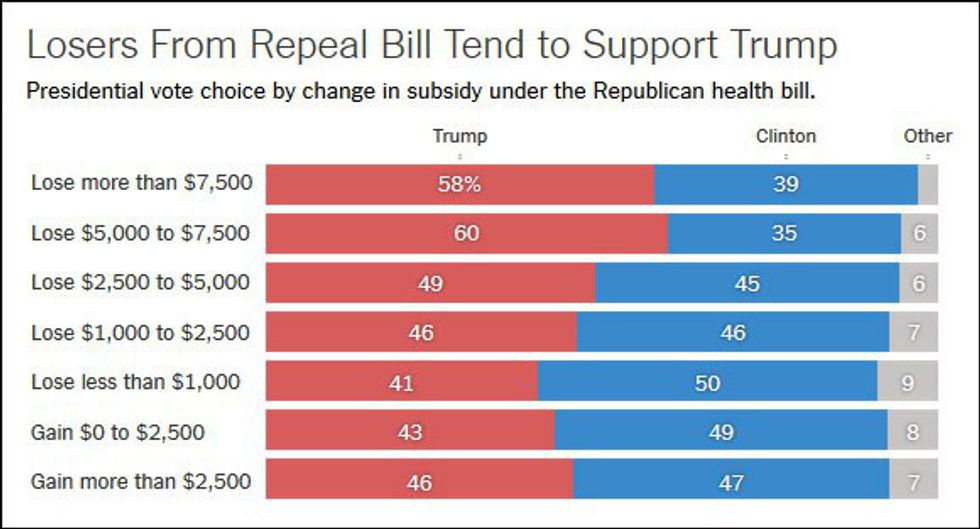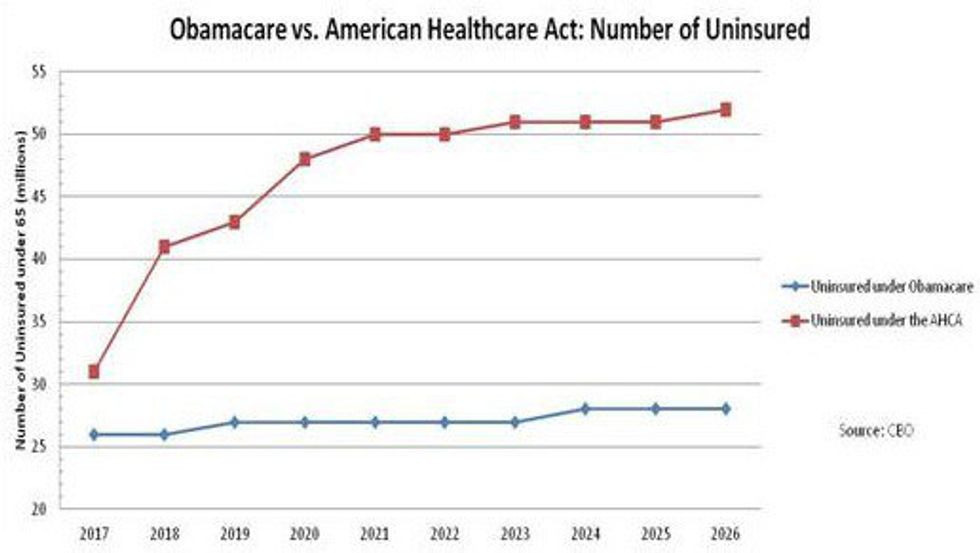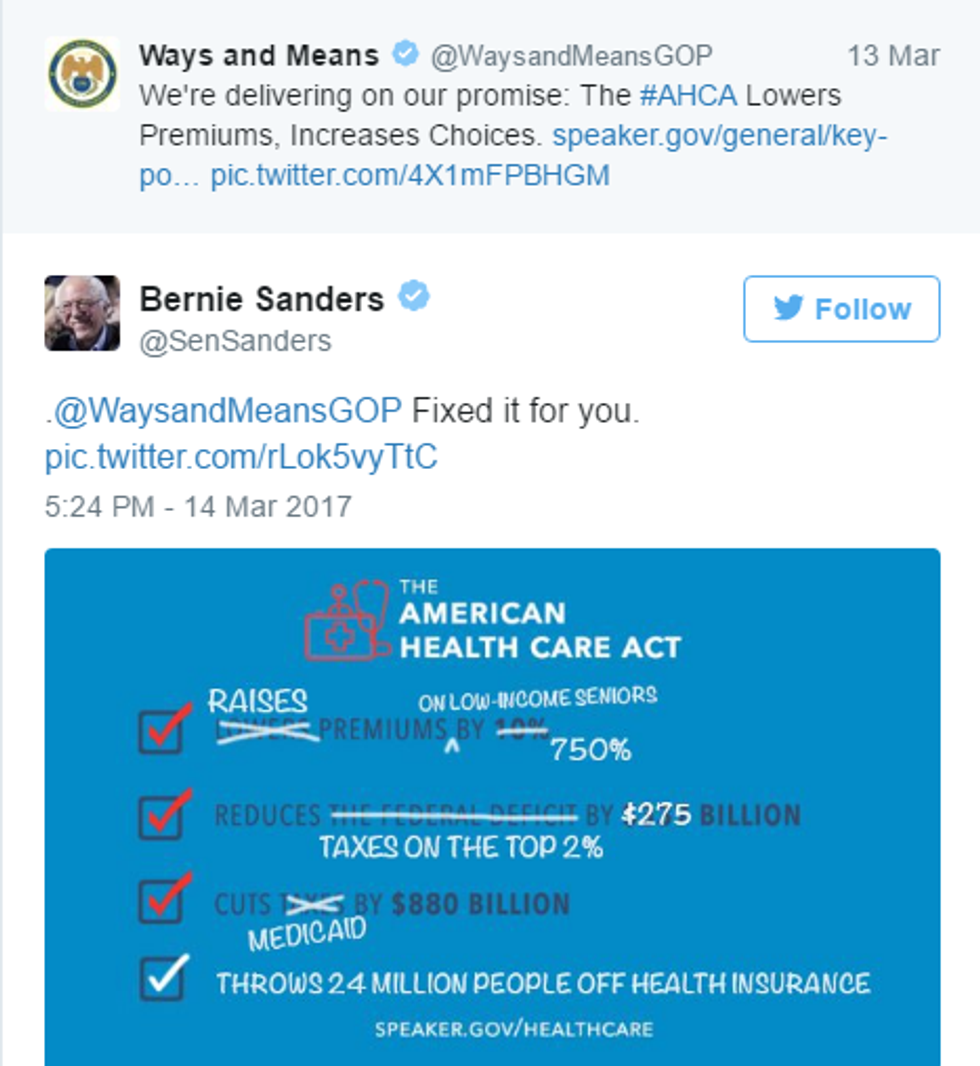Who knew healthcare could be so complicated? Basically, everybody.
In his campaign platform, President Trump made some very generous healthcare promises. He ran on not cutting Medicare, Medicaid, or Social Security. Medicare is one of the most popular government programs, even among conservatives. Why is it that Republican town halls all over this country have been flooded with outraged constituents, largely concerned with the new administration's "American Health Care Act"? Additionally, why do President Trump voters have the most to lose from it?

It is clear that the AHCA or AHA is probably not Donald Trump's plan. In fact, President Trump does not want to put his name on it. For a man who puts his name on practically everything, why not this? It is not politically savvy to put your name on a policy, anyway. If it's not TrumpCare, what do we call it? To be a bit more accurate, it could be called RyanCare, named after Speaker of the House Paul Ryan (R-WI). Ryan is a long-time opponent of Obamacare. An outspoken opponent. Repealing Obamacare is perhaps his number one priority. As for the replacement, not so much.
Very few people believe that the Affordable Care Act (ACA), or Obamacare, is perfect. While it has helped about 20 million people get insurance, it has also hurt many of them with high premiums, deductibles, and copayments. However, let's be clear that repealing Obamacare is not the solution to these problems. It does not go after the insurance companies. If the ACA didn't do this, the AHCA is certainly not the solution either in this aspect.
The Congressional Budget Office (CBO) released their assessment on Monday, March 13th. The CBO is a bipartisan, independent office which examines the impacts of policy on the American people. Days before this happened, the White House already began to destroy the credibility of the CBO. Here is a summary of their findings:
Essentially, if you are rich, healthy, or younger, you will not be affected as much as the poor, elderly, sick, and those living in rural areas. The rate of people under 65 who are uninsured is fairly steady at the moment under the ACA. Under the GOP plan, uninsured rates would rise from 12% to 18.6%. This will amount to 14 million citizens by 2018, and 24 million citizens by 2026. The only Trump voters who will benefit for this are the ones in the highest income brackets. It is a radical redistribution of wealth from his poorer voters to the most wealthy.
As for premiums, these will rise for everybody. Significantly. Lower-income, older Americans are expected to see premiums rise by eight times what they are currently paying under Obamacare. The counterclaim is that premiums would drop by 10% in 10 years, but this clearly is not enough when elderly patients are seeing premiums rise 800% from what they are now. In the individual market, the premium rise of 20% is still greater than the 10% drop. The GOP plan eliminates out-of-pocket subsidies, raising healthcare costs on everybody.
While this is happening, the top 2% would receive almost $300 billion in tax breaks. To provide these tax breaks, the AHCA would essentially ration care at the expense of the most vulnerable. This is ironically the "death panel" that Sarah Palin (R-AK) warned us about regarding Obamacare. While the AHCA is thought to save $880 billion in the next 10 years by cutting Medicaid, this violates a key Trump campaign promise.
The federal cap on spending would also make it more expensive for the states to provide coverage. This is a risk for 11 million adults.
The word "access" is important, as it is vital to overcome political doubletalk. Every GOP politician believes that we should have "access" to healthcare. It sounds solid and not debatable. However, access is an empty word that means nothing in practice.
We have access to a lot of things. The poor have access to eat at a five-star restaurant every night. The sick have access to quality health care. Every child has access to a college education. They have access to all of these things, but simply cannot afford them. Under the AHCA, you or your loved ones may no longer be covered, you cannot afford healthcare under the new plan, but there will still be that access.
There is massive opposition to the AHCA. Not only from the American people but from medical organizations to politicians, even including GOP politicians. If there was a time for GOP Representatives and Senators to place country over party for the good of their most vulnerable constituents, this is the time.
If there is a time to listen to 58% of Americans who support a federally funded, single-payer, healthcare for all system, now is the time. This is not the time to cut Meals on Wheels, thereby depriving many seniors of the only way in which 2.5 million Americans including 500,000 veterans can access food. It is certainly not the time to dangle healthcare in front of the American people, taunting them with "access" to what we cannot afford.























